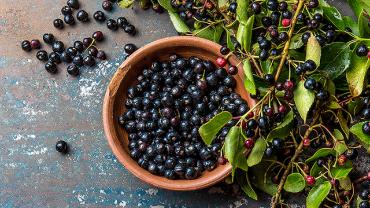
Maqui (Aristotelia chilensis) is a berry from the Patagonia region of South America. This berry has a rich history with Mapuche communities in Chile and southern Argentina where it was traditionally used to treat inflammation, diarrhea, pain, and many other conditions. Maqui is known in pharmacological research for its powerful antioxidant properties, and it has been identified to have the highest oxygen radical absorbance capacity (ORAC) among fruits. The antioxidant capacity of maqui is 2.9 times stronger than blueberries.
Maqui is known to be the richest natural source of delphinidins, a class of anthocyanidins that are responsible for the red and blue hues in some berries and grapes, as well as supporting many functions in human health. Delphinidins have been shown to support healthy responses to inflammation, as well as cardiovascular health by decreasing platelet adhesion. They have also been shown to possess high radical scavenging activity.
Maqui has also been shown to support eye health. Dry eye syndrome is becoming increasingly common in many populations due to an increase in risk factors, including the use of computers and other screen-based devices. Inflammation due to an increased amount of reactive oxygen species (ROS) in the corneal epithelial cells cause a decrease in the stability of the tear film layer, which is believed to be the main contributor to dry eye syndrome. Therefore, antioxidants may help reduce dry eye symptoms.
A randomized double-blind placebo-controlled clinical trial assessed the efficacy of maqui berry for dry eyes. The study included participants with the presence of eye fatigue and dry eyes who use screens for more than 4 hours per day. After 4 weeks of supplementation with maqui berry extract, the treatment arm showed a significantly higher tear fluid generation compared to a placebo in both eyes.
Maqui has also been shown to affect metabolic processes in the human body. A 3-month clinical trial assessed the impact of maqui extract on markers such as HbA1C, high-density lipoprotein (HDL) and low-density lipoproteitn (LDL) cholesterol levels, triglycerides, and total cholesterol in individuals with pre-diabetic status. After 3 months, a reduction in HbA1C was observed, in addition to a significant increase in HDL and a significant decrease in LDL. A different study in patients with pre-diabetic status showed a significant decrease in blood glucose 30 minutes after an oral glucose challenge test when maqui extract was administered.
Maqui berry has been shown to be a powerful antioxidant. Supplementation with this fruit extract may support a healthy inflammatory response, healthy glucose metabolism, and eye health.
By Colleen Ambrose, ND, MAT